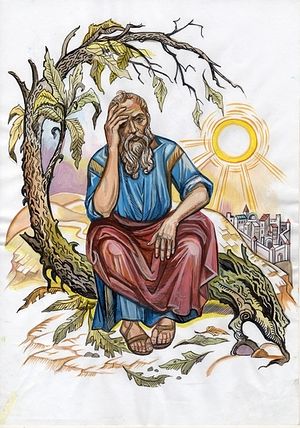The warning of the whiny prophetThroughout the year, the Southern New England Conference of the United Church of Christ produces the Daily Lectionary for use by churches. These are the suggested readings for Friday, February 28th: Psalm 51; Jonah 4:1-11; and Romans 1:8-17. I would encourage you to read these short selections as part of your Lenten practice.
Today is the first Friday of Lent. Fridays seem to take on a special importance during Lent as they remind us a bit more strongly of Good Friday. I’ve been asked to prepare a short meditation on the virtue of Christian love for a group I belong to in the area. My plans are to base the meditation on the Book of Jonah. I’m choosing Jonah because I have no idea of how familiar the members are with the stories of the Bible. There is a good chance, however, that many if not all of them will be familiar with the story of Jonah. Jonah is not an historical account. It is a prophetic parable, if you will. Usually in a prophetic book the prophet’s words are front and center. In this book, Jonah prophesies one unremarkable sentence. In this book, all of the other characters beside the prophet are decent. Jonah, on the other hand, is whiny and self-absorbed. Jonah is presented as the anti-hero. In today’s selection from Jonah, God has already “changed his mind” about destroying Nineveh. God’s forgiveness is resented by the prophet: “‘… I knew that you are a gracious God and merciful, slow to anger, and abounding in steadfast love, and ready to relent from punishing.’” When a merciful God looks toward us, we appreciate it, but the point of the book of Jonah is why shouldn’t we do the same when God looks at others, whoever they are? This is the reason why God asks, “‘Is it right for you to be angry?’” Jonah’s is a negative righteousness. He uses his “righteousness” to separate himself from others. The Ninevites were enemies of Israel. They had defeated and deported much of the prophet’s nation. Jonah wished to see the favour returned. Jonah was looking for vengeance from God, not forgiveness. Then there is the story of the shady bush that grows quickly and dies just as quickly, and again the whiny prophet prays for death because of the lost shade. He’s sitting on a hillside waiting for 12 x 10,000 people to be sacrificed. 12 is a symbolic number of fullness and 10,000 symbolizes a vast, uncountable aggregate. Jonah whines because he is hot, but Jonah cannot sympathize with the suffering and death of an entire population. Jonah does not see them as human, and God must remind His prophet that He loves all of creation, even the “many animals.” This is a foreshadowing of the love of Christ as He accepts the brutality of the cross. Jesus dies not only for saints, but for sinners, not only for believers, but even for the ones who put nails through His holy flesh and wait for Him to die. Lent asks us to ponder this revelation of unconditional love. And the Book of Jonah confronts us with the prophet’s negative righteousness as a warning to consider. The love of a crucified Saviour is hard to process. This is why we need to help each other in our faith. Paul shares with us today this same message: “… so that we may be mutually encouraged by each other’s faith, both yours and mine.” On this first Lenten Friday, may we give some of our time to meditating upon the cross, what Jesus reveals on it, and our response to it. And may we be there for each other to help build-up the community of faith so that the community may help build-up the faith of each of us.
0 Comments
Leave a Reply. |
NewsFaith, love and chitchat. Categories
All
Archives
June 2024
Follow
|
|
SERVICE TIMES
Sunday 9:30-10:30am Children Sunday School 9:30-10:30am Nursery care available during worship DONATE Make a single or recurring contribution by clicking here |
FOLLOW
|

 RSS Feed
RSS Feed
